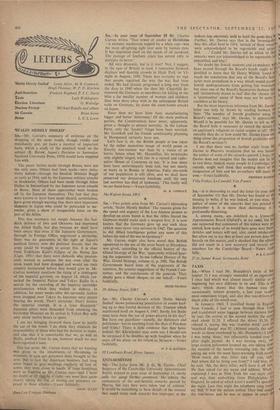SIR, —The letter from Mr. J. G. W. Davies, Chief Secretary
of the Cambridge University Appointments Board, printed in your issue of September 11, surely calls for .$0rug further ,,cornment. "He admits the authenticity of the anti-Semitic remarks quoted by Pharos, but says they were taken 'out of context.' It would be interesting to have details of the context that could make such remarks less improper, or the
A
makers less obviously unfit to hold the posts they., Further, Mr. Davies says that in the 'investigati into this affair held in 1954, 'certain of these remar were acknowledged to be regrettable and unjus fled. . . .' Could Mr. Davies tell us which of the remarks were not acknowledged to be regrettable a unjustified, and why?
No doubt the Jewish students and ex-students w have passed through the Board's hands ought to gratified to learn that Sir Henry Willink 'bould a reach the conclusion that any of the Board's Sec taries were prejudiced in a way which would preve Jewish undergraduates from getting fair treatmen but since one of the Board's Secretaries declares ht self 'instinctively drawn to feel' that the 'chosen ra is 'unattractive' many of them may not be quite confident as Sir Henry. • But the most important inference from Mr. Davies letter can only be drawn by reading between t lines. 'The number of Jewish graduates using th Board's services,' says Mr. Davies, 'is appreciable Would it be possible for Mr. Davies to tell us the Board feels it necessary to record the details an applicant's religious or racial origins at all? (Pr sumably they do, or how could Mr. Davies know an thing about the proportion of Jewish graduates usi the Board's services?)
I see that there was no further reply from M Davies to Pharos's revelation that he was himse the author of some of the remarks quoted. I hope M Davies does not imagine that the matter can be le to rest there. Indeed, many people in Cambridge, an outside, might well think that nothing short of th resignation of him and his co-authors will meet


































 Previous page
Previous page